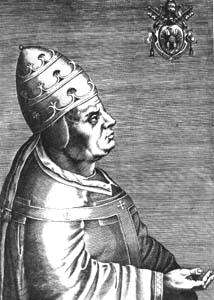|
|
 Not
for seventy-five years had Rome seen a conclave. The cardinals
met at the Vatican on April 7 in the midst of excited clamoring
for a Roman or at least an Italian pope. Oddly enough, in view
of the troubles to come, there was little difficulty agreeing on
a candidate. Though the French cardinals had a big majority,
they were split between the Limousins and the others. As in
1362, they looked outside the Sacred College and chose
Bartolommeo Prignano, archbishop of Bari. At first glance he was
an excellent compromise. Not a cardinal, he had been closely
connected with the curia as acting vice-chancellor. Not a
Frenchman, he was a subject of the French queen of Naples and
had lived for years at Avignon. Outside the Vatican a mob was
roaring, and on April 8 the guards told the cardinals to hurry
it up. It was at this point that Prignano was elected by a vote
of fifteen to one, Orsini dissenting because he feared the
election might be considered invalid. Later on, during a lull in
the mob activities, the cardinals once again elected Prignano
unanimously. After this, the mob broke in, terrified the
cardinals, and pillaged the palace. The excitement subsided and
Prignano, informed of his election, accepted and chose to be
called Urban VI. The cardinals now enthroned Urban, asked him
for the customary favors, and wrote to their six colleagues at
Avignon that they had made a free election. Yet within six
months they revolted, declared Urban's election invalid and
elected an antipope! Not
for seventy-five years had Rome seen a conclave. The cardinals
met at the Vatican on April 7 in the midst of excited clamoring
for a Roman or at least an Italian pope. Oddly enough, in view
of the troubles to come, there was little difficulty agreeing on
a candidate. Though the French cardinals had a big majority,
they were split between the Limousins and the others. As in
1362, they looked outside the Sacred College and chose
Bartolommeo Prignano, archbishop of Bari. At first glance he was
an excellent compromise. Not a cardinal, he had been closely
connected with the curia as acting vice-chancellor. Not a
Frenchman, he was a subject of the French queen of Naples and
had lived for years at Avignon. Outside the Vatican a mob was
roaring, and on April 8 the guards told the cardinals to hurry
it up. It was at this point that Prignano was elected by a vote
of fifteen to one, Orsini dissenting because he feared the
election might be considered invalid. Later on, during a lull in
the mob activities, the cardinals once again elected Prignano
unanimously. After this, the mob broke in, terrified the
cardinals, and pillaged the palace. The excitement subsided and
Prignano, informed of his election, accepted and chose to be
called Urban VI. The cardinals now enthroned Urban, asked him
for the customary favors, and wrote to their six colleagues at
Avignon that they had made a free election. Yet within six
months they revolted, declared Urban's election invalid and
elected an antipope!
Urban VI had been a successful curia official, well-known to the
cardinals for his austere goodness and his efficiency. But once pope, Urban's
austere but fiery disposition knew no bounds. His plans were excellent, his
execution faulty. He promised a thorough reform, but began it by tongue- lashing
cardinals and bishops until their souls quivered in angry humiliation. He
threatened loudly to end French domination of the Church by creating large
numbers of Italian cardinals. But he did not act, and while he raged on,
cardinals were slipping away to gather finally at Fondi. There on September 20,
1378, declaring that Urban's election was invalid because of fear, the cardinals
elected an antipope, Robert of Geneva, who took the name Clement VIII. Failing
to take Rome from Urban, he retired to Avignon.
Europe was torn apart. Most of Italy, the Empire, England,
Poland, and Hungary remained loyal to Urban, while France, Scotland, Naples, and
the Spanish kingdoms eventually backed Clement. Saints were on both sides. St.
Catherine of Siena wrote to Urban, "Those devils in human form have made an
election. They have not elected a vicar of Christ, but an anti-Christ." Yet St.
Vincent Ferrer supported Clement.
Urban proved to be a difficult ruler. His intemperate harshness
embroiled him in quarrels on all sides. His plans for reform were balked by the
confusion. His pontificate was unhappy. On October 30, 1389, Urban died with
Europe in turmoil and even his own followers disheartened.
Excerpted from "Popes
Through the Ages" by Joseph Brusher, S.J.
  
|

